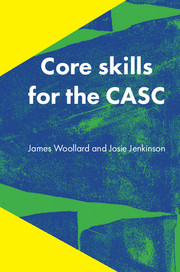Introduction
Published online by Cambridge University Press: 01 January 2018
Summary
Background
We are assuming that if you are reading this you are planning to sit the Clinical Assessment of Skills and Competencies (CASC) exam of the Royal College of Psychiatrists at some point in the future. It may be that you are currently in a training post either in or outside the UK, or working in a non-training post in psychiatry. Of course it may also be that you have interest in developing the skills required for the exam in those that you supervise or mentor.
As such, some of you may already know the details of the exam and perhaps have even sat it before. For those who are new to the exam, we will start by outlining the basics.
The CASC exam
The CASC exam has been the final membership examination of the Royal College of Psychiatrists since 2008. In its current form the exam involves two circuits of eight ‘stations’. The examination is held over the course of 1 day, with a morning and afternoon session. The morning circuit involves four paired stations of 10 min each with 90 s of reading time before each station. The afternoon circuit involves eight stand-alone stations, again with 90 s of reading time before each station.
For paired stations, information gathered in the first station is used in the following one, for example taking a history from a patient in the first station and discussing the assessment with their relative in the second.
Currently, to be eligible to sit the exam you need to have passed all written papers set by the College and have 24 months of wholetime equivalent post-foundation or internship experience in psychiatry. Detailed and up-to-date eligibility criteria can be found on the examination pages of the College's website, www.rcpsych.ac.uk/traininpsychiatry/ examinations.aspx
Structure of this book and how to use it
This book has three main sections. Part 1 describes core verbal and nonverbal communication skills, and outlines techniques for their development and practice. There are also techniques for managing time, taking control, as well as when and how to use a more structured approach. This section concludes with a chapter on the specific procedural skills that are tested in the exam, such as physical examination, cognitive assessment and interpretation of investigations.
- Type
- Chapter
- Information
- Core Skills for the CASC , pp. vi - viiiPublisher: Royal College of PsychiatristsPrint publication year: 2016

